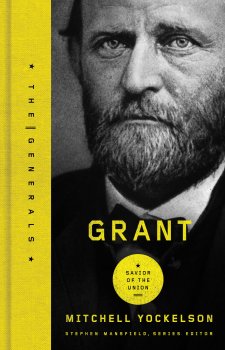Have a blog? Like free books? Check this out.
 I really like this series that Thomas Nelson is publishing on The Generals, and author Mitchell Yockelson’s contribution on General Grant is one more reason why.
I really like this series that Thomas Nelson is publishing on The Generals, and author Mitchell Yockelson’s contribution on General Grant is one more reason why.
Grant was born to an abolitionist tanner, and wanted nothing to do with the military when he was young. He graduated from West Point because his father enrolled him when he expressed total disinterest in the tanning business. He did his time, disliked it, and left to try his hand at marriage and civilian life.
He failed at civilian life, however (though not at marriage). When South Carolina ceded from the union, he responded with what he believed was his patriotic duty, and joined the U.S. Army again.
Grant was a modest man, which greatly endeared his troops to him.
He often wore a dirty private’s uniform, and so down-played his dress that it was hard to recognize who was in charge at times. He lived in the same tents and cabins as his troops throughout the war.
Yockelson’s biography clears up a few misconceptions about General Grant, and explains what the public at the time didn’t know.
It is generally understood that Grant had a drinking problem, for example, a rumor that plagued his military career, and which is simply untrue.
He also got the nickname, “the Butcher” during the Civil War because of the seemingly high number of casualties among his armies. The north, however, didn’t get casualty reports from the south, and so didn’t realize the scope of the battles. Americans eventually became weary of the war, and that attitude combined with Grant’s offensive combat strategy to tarnish his reputation – perhaps unfairly.
Grant was not a flawless leader, and he recognized that.
One of the things I really like about this series is that it’s authors do not romanticize our American Generals, or gloss over their failures. Yockelson outlines exactly how Grant’s failures hindered the Union’s war efforts more than once. Later, when he left the Oval Office after two terms, he actually apologized in his farewell address for his mistakes and ineptitudes in the Office.
Thomas Nelson finds the pros to write these biographies. Yockelson is an Investigative Archivist at the National Archives and Records Administration, and a history instructor at the U.S. Naval Academy and Norwhich University.
If you’re interested in history and biography, and/or leadership, check out this series. I reviewed Sherman here, and Pershing (my fave so far) here.

I read, quite a while ago, the William S. McFeely biography of Grant, and like you came away with a deeper understanding of the man. I very frequently recall the description in the book about him writing his memoirs at the very end of his life (he died while they were being published). Will I be able to remember enough detail about my life to fill a two volume autobiography? I can’t imagine it!
Ya, isn’t that crazy? He apparently put off writing his memoirs, until he discovered he was ill. I think he finished a day or two before he passed. May I even LIVE a life that would fill two volumes, even if I DON’T remember it all.